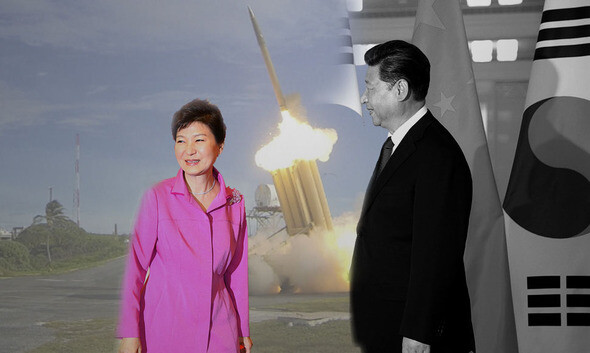hankyoreh
Links to other country sites 다른 나라 사이트 링크
How might China respond to South Korea’s THAAD deployment?

After China’s Ministry of Defense said on July 8 that it “would consider necessary measures” in connection with the US and South Korea’s agreement to deploy the THAAD missile defense system in South Korea and after China’s Ministry of Foreign Affairs mentioned “equivalent counter measures” on July 11, there is growing interest what exactly those measures may involve.
The issue of greatest concern is the possibility of China taking military measures to enable it to neutralize THAAD in the event of a crisis.
On July 8, China’s Renmin Network quoted a military expert as saying, “China must be firm and take strategic measures. For example, it should increase military countermeasures to respond to THAAD in South Korea so as to hit THAAD first in the event of war.” Such actions would obviously increase South Korea’s security concerns.
China could also suspend military exchange with South Korea. At the end of last year, the two countries established the first ever direct telephone hotline between the two defense ministers.
Members of the business community are most concerned that the real harm could be caused by economic retaliation measures. Such retaliation is likely to come either through existing legal regulations or through the private sector: China could toughen non-tariff barriers to trade such as customs and hygiene inspections of South Korean products, or it could mobilize the state-run media to organize boycotts. It is also conceivable that the 23,000 or so South Korean companies that are doing business in China (as of 2013) could be the victims of targeted clampdowns.
There was a troubling report on June 11 that China’s JAC Motors had stopped producing electric cars containing batteries made by Samsung SDI. China has recently emerged as the world’s largest market for electric cars.
Production stopped because Samsung SDI and LG Chem were not included in a list of battery makers eligible to receive government subsidies that was announced last month. But there are some who note that this coincides with the tougher stance China has adopted following the decision to deploy THAAD.
Samsung SDI is very uncomfortable with the idea of drawing a connection between this and the decision to deploy THAAD.
“The Chinese government will grant certification for parts made by foreign companies in due time. There is a section in the standards about assessing the ability to prevent the emission of environmental toxins, which requires that companies be in production for more than a year. Our Chinese factory began operating in Oct. 2015, so it hasn’t been a year yet. We’re preparing another application for certification,” said a spokesperson for Samsung SDI.
Along with this, there are also diplomatic measures that China can Russia can take together. After two summits that occurred over the course of three days at the end of last month, Chinese President Xi Jinping and Russian President Vladimir Putin released two joint statements in a row that expressed their opposition to the deployment of THAAD on the Korean Peninsula.
Since North Korea’s fourth nuclear test in January, South Korean diplomats have been concentrating on putting pressure on North Korea and seeking cooperation on the North Korean nuclear issue, but now they are in danger of losing the two important countries of China and Russia at the same time.
There are also concerns that China will take steps to reduce cultural and people-to-people exchange.
The number of Chinese tourists to Hong Kong and Taiwan fell after pro-democracy demonstrations in Hong Kong two years ago and after the Democratic Progressive Party took power in Taiwan this year, prompting numerous analysts to accuse the Chinese government of controlling the number of tourists for political and diplomatic purposes.
By Kim Jae-seob, staff reporter
Please direct questions or comments to [english@hani.co.kr]

Editorial・opinion
![[Column] Has Korea, too, crossed the Rubicon on China? [Column] Has Korea, too, crossed the Rubicon on China?](https://flexible.img.hani.co.kr/flexible/normal/500/300/imgdb/original/2024/0419/9317135153409185.jpg) [Column] Has Korea, too, crossed the Rubicon on China?
[Column] Has Korea, too, crossed the Rubicon on China?![[Correspondent’s column] In Japan’s alliance with US, echoes of its past alliances with UK [Correspondent’s column] In Japan’s alliance with US, echoes of its past alliances with UK](https://flexible.img.hani.co.kr/flexible/normal/500/300/imgdb/original/2024/0419/2317135166563519.jpg) [Correspondent’s column] In Japan’s alliance with US, echoes of its past alliances with UK
[Correspondent’s column] In Japan’s alliance with US, echoes of its past alliances with UK- [Editorial] Does Yoon think the Korean public is wrong?
- [Editorial] As it bolsters its alliance with US, Japan must be accountable for past
- [Guest essay] Amending the Constitution is Yoon’s key to leaving office in public’s good graces
- [Editorial] 10 years on, lessons of Sewol tragedy must never be forgotten
- [Column] A death blow to Korea’s prosecutor politics
- [Correspondent’s column] The US and the end of Japanese pacifism
- [Guest essay] How Korea turned its trainee doctors into monsters
- [Guest essay] As someone who helped forge Seoul-Moscow ties, their status today troubles me
Most viewed articles
- 1[Column] The clock is ticking for Korea’s first lady
- 2Samsung barricades office as unionized workers strike for better conditions
- 3After 2 months of delayed, denied medical care, Koreans worry worst may be yet to come
- 4[Correspondent’s column] In Japan’s alliance with US, echoes of its past alliances with UK
- 5[Column] Has Korea, too, crossed the Rubicon on China?
- 6Hong Se-hwa, voice for tolerance whose memoir of exile touched a chord, dies at 76
- 7All eyes on Xiaomi after it pulls off EV that Apple couldn’t
- 8US overtakes China as Korea’s top export market, prompting trade sanction jitters
- 9[Photo] Smile ambassador, you’re on camera
- 10[Guest essay] How Korea turned its trainee doctors into monsters